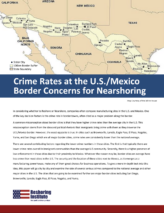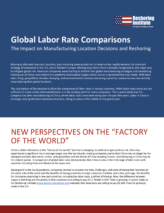Minimum Wages and Reshoring
Wage rates are often the starting point for global manufacturing strategies and reshoring decisions. Low wages in foreign countries, particularly China, and lower overall cost of operations drove the offshoring of U.S. manufacturing in the late 1990s and early 2000s. However, business conditions change over time, including labor rates and operational strategies. For China in particular, labor rates
have risen to the point that China can no longer be considered a low-cost country.
Crime Rates at the U.S./Mexico Border
A common misconception about border cities is that they have higher crime rates than the average city in the U.S. This misconception stems from the idea and political rhetoric that immigrants bring crime with them as they traverse the U.S./Mexico border. However, the exact opposite is true. In cities such as Brownsville, Laredo, Eagle Pass, El Paso, Nogales, Yuma, and San Diego which are all major border cities, crime rates are consistently lower than the national average.
Global Labor Rate Comparisons
Moving to alternate low-cost countries, plus reshoring some production to America has rapidly become the dominant strategy of companies in the U.S. and in Western Europe. Moving away from China is broadly recognized as one major way to mitigate global risk. American companies were starting to rethink their global manufacturing strategies and considering moving out of China, even before the pandemic drove global supply chains into an unprecedented crisis mode. With labor rates rising, geopolitical climates changing, and environmental concerns becoming a priority, companies are now actively reconsidering their global locations.
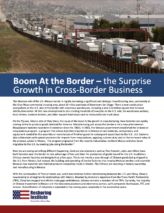
Boom at the Border
The Mexican side of the U.S.-Mexico border is rapidly becoming a significant and strategic manufacturing area, particularly at the Otay Mesa commercial crossing area, about 25 miles southeast of downtown San Diego. There is new construction everywhere on the U.S. side of the border with enormous warehouses, including a new 3.4 million-square-foot Amazon distribution center. All this new development is also creating hundreds of new jobs on the U.S. side, for warehouse workers, truck drivers, customs brokers, and other support businesses such as restaurants and truck stops.
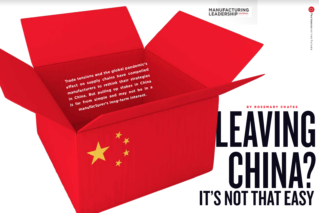
Leaving China? It’s Not That Easy
Are you packing up your operations in China and moving to another low-cost country or reshoring back to the U.S.? Many companies are rethinking their global manufacturing strategy in light of the global pandemic and recognizing supply chain vulnerabilities. Reshoring is the hottest topic on executive agendas and in board rooms across the U.S.
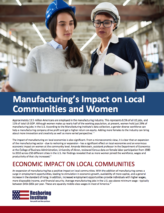
Manufacturing’s Impact on Local Communities and Women
Approximately 13.5 million Americans are employed in the manufacturing industry. This represents 8.5% of all US jobs, and 11% of total US GDP. Although women make up nearly half of the working population, at present, women hold just 29% of manufacturing jobs in the U.S. According to the Manufacturing Institute’s data collection, a gender diverse workforce can help a manufacturing company drive profit and get a higher return on equity. Adding more females to the industry can bring about more innovation and creativity as well as more varied perspective.
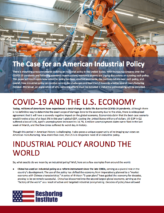
The Case for an American Industrial Policy
There is mounting pressure towards building an industrial policy in the United States. With increasing concerns over the COVID-19 pandemic and following economic repercussions, economic experts are urging discussions on curating such policy. This paper will touch upon how industrial policy has been enacted worldwide, the partisan debate over such policy, and overall, how industrial policy can soothe current-day challenges and lead the US towards a better overall manufacturing mindset.
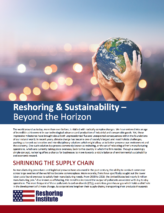
Reshoring & Sustainability – Beyond the Horizon
The reshoring of manufacturing is a tangible method for accomplishing sustainability. It encourages firms to consider the long-term implications within their industry through consistent environmental stewardship. By keeping manufacturing onshore we can better understand how to shift away from inefficiencies and environmental degradation.
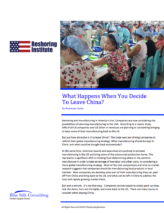
What Happens When you Decide to Leave China?
The hottest trend in US manufacturing is Reshoring. According to a recent study by Boston Consulting Group, 54% of all US companies over $1 billion in revenues are planning or considering bringing at least some of their manufacturing back to the US. But just how attractive is it to leave China? This decision isn’t an easy one.

St. Louis – Gateway to Reshoring
The iconic Gateway Arch stands 630 feet tall over the city of St. Louis, representing the American westward expansion.
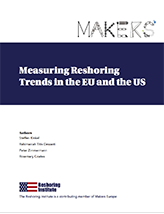
Measuring Reshoring Trends in the EU and the US
Policymakers and academics are increasingly aware of the reshoring/backshoring of once offshore manufacturing capacities, the current debate in the US and Europe is whether restoring activities help restore industrial competitiveness in high-wage countries.
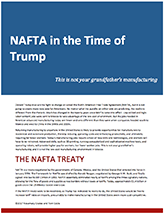
NAFTA in the Time of Trump
Donald Trump may win his fight to change or cancel the North American Free Trade Agreement (NAFTA), but it is not going to create many new jobs for Americans.
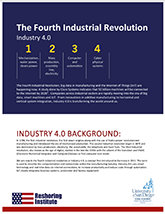
The Fourth Industrial Revolution
The Fourth Industrial Revolution, big data in manufacturing and the Internet of Things (IoT) are happening now.
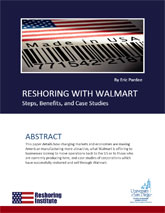
Reshoring with Walmart
This white paper details how changing markets and economies are making American manufacturing more attractive, what Walmart is offering to businesses looking to move operations back to the US or to those who are currently producing here, and case studies of corporations which have successfully reshored and sell through Walmart.
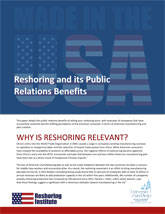
Reshoring and its Public Relations Benefits
This white paper details the public relations benefits of telling your reshoring story, with examples of companies that have successfully reshored and the shifting perceptions of the American consumer in terms of American manufacturing and jobs creation.
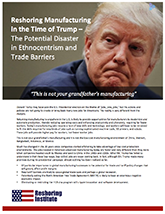
Reshoring Manufacturing in the Time of Trump
Donald Trump may have won the U.S. Presidential election on the theme of “jobs, jobs, jobs,” but his actions and policies are not going to create or bring back many new jobs for Americans. The reality is very different from the rhetoric.
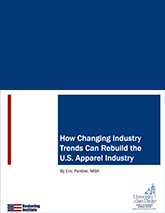
Rebuilding the Apparel Industry
This presentation examines the current state of the U.S. Apparel Industry and explores the benefits of bringing manufacturing and sourcing back to the U.S.
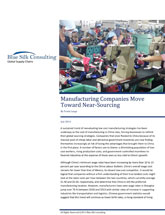
Manufacturing Companies Move Toward Near-Sourcing
Manufacturers have seen wage rates in Shanghai jump over 76% between 2010 and 2013 with similar rates of increase in supporting industries like transportation and logistics. Chinese government statistics would suggest that this trend will continue.


